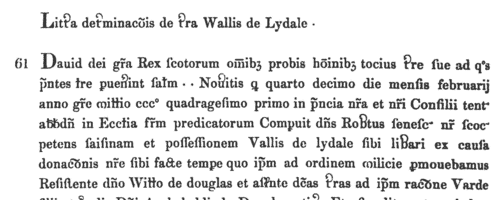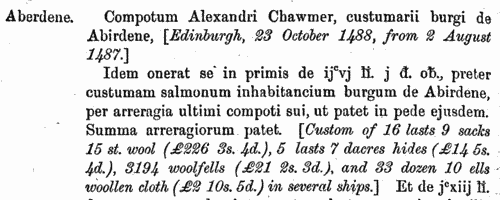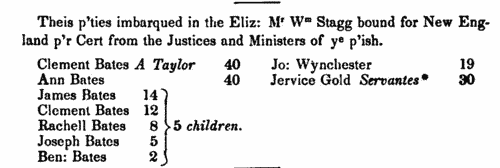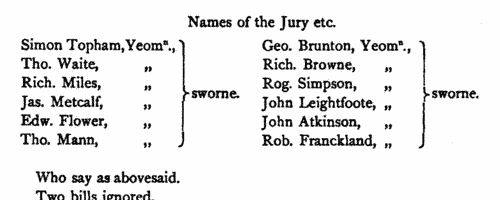Lowis Surname Ancestry ResultsOur indexes 1000-1999 include entries for the spelling 'lowis'. In the period you have requested, we have the following 101 records (displaying 1 to 10): Single Surname Subscription | | | Buying all 101 results of this search individually would cost £514.00. But you can have free access to all 101 records for a year, to view, to save and print, for £100. Save £414.00. More... |
These sample scans are from the original record. You will get scans of the full pages or articles where the surname you searched for has been found. Your web browser may prevent the sample windows from opening; in this case please change your browser settings to allow pop-up windows from this site. Grantees of offices, commissions and pardons
(1272-1281)
The Patent Rolls are the Chancery enrolments of royal letters patent. Those for the 1st to the 9th years of the reign of king Edward I (29 November 1272 to 17 November 1281) were edited for the Public Record Office by J. G. Black, and published in 1901. The main contents are royal commissions and grants; ratifications of ecclesiastical estates; writs of aid to royal servants and purveyors; and pardons. LOWIS. Cost: £2.00.  | Sample scan, click to enlarge

| Inhabitants of Leicester
(1103-1327)
The Corporation of Leicester commissioned the publication (in 1899) of extracts from the earliest borough archives, edited by Mary Bateson. This volume brings together several important sources: the borough charters; the merchant gild rolls (from 1196 onwards); tax returns; court rolls (from about 1260 onwards); mayoral accounts, &c. All the Latin and French texts are accompanied by English translations. Membership of the merchant gild was by right of inheritance (s. p. = sede patris, in his father's seat), or by payment of a fee called a 'bull' (taurus). The sample scan shows part of a gild entrance roll; those marked * paid their bull, and were thus, by implication, not natives, or at least not belonging to gild merchant families. By 1400 membership of the gild merchant had become the equivalent of gaining freedom of the borough (being a free burgess): but at this period the two were not necessarily the same, and some of the merchant gild members were not resident in the borough, merely traded there. Not all the tax rolls surviving for this period are printed: but full lists of names are given for a loan for redemption of pontage and gavelpence of 1252-3 (pp. 44-46); five tallages of 1269 to 1271 brought together in a single table (128-145); and tallages of 1286 (208-211), 1307 (255-257), 1311 (272-274) and 1318 (310-313). The portmanmoot (or portmote) was the borough court dealing with minor infractions and civil suits. Finally, there is a calendar of charters (from c.1232 onwards, 381-400), and a list of mayors, bailiffs (reeves), receivers and serjeants (401-407).
LOWIS. Cost: £4.00.  | Sample scan, click to enlarge

| Douglas family charters
(1150-1400)
The register of the more ancient writs of the Douglases of Dalkeith, Midlothian, Earls of Morton is probably the oldest chartulary of lay possessions in Scotland, and contains about 300 charters. It was edited by C. Innes and published by the Bannatyne Club in 1853 as part II of the Registrum Honoris de Morton. The names that occur are principally those of grantors, grantees and witnesses, mostly from Midlothian.LOWIS. Cost: £4.00.  | Sample scan, click to enlarge

| Officers and tenants of the Scottish crown
(1488-1496)
In 1887 the 10th volume of Rotuli Scaccarii Regum Scotorum, or The Exchequer Rolls of Scotland, was published in Edinburgh as part of the Scottish Series of Chronicles and Memorials. The main text is a transcript in extended Latin, but with some passages reduced to an abstract in English (in italics), of the rolls of the Scottish royal exchequer from 19 June 1488 to 12 October 1496 (rolls cclxxviii to ccxcv, old numbers ccxciii to cccix). This more or less continuous series alternates between accounts of the Ballivi ad Extra (royal chamberlains, lessees of lordships, rangers of wards, receivers &c) and those of the Custumars (receivers of customary payments and similar revenues) and bailies (bailiffs) of burghs (boroughs). In all, they give a summary description of all these sources of royal revenue - and not only mention the payers and receivers in general, but also refer to many occasional payments to and receipts from individuals hardly otherwise found in the surviving records. An appendix (pages 629 to 763) of rentals of royal property throughout Scotland in the same period gives a rich harvest of personal names; and another (764-772), an Index in Libros Responsionum, lists persons to whom sasine (seisin) was granted in 1492 to 1496.LOWIS. Cost: £4.00.  | Sample scan, click to enlarge

| Scottish litigants, rebels and cautioners
(1578-1585)
The Privy Council of Scotland exercised a superior judicial authority in the kingdom, and consequently received and dealt with a constant stream of petitions, as well as dealing with the internal security of the state. This register of the council from 17 June 1578 to 31 July 1585, in the reign of king James VI, was edited by David Masson, and published under the direction of the Lord Clerk Register of Scotland in 1880. Some of the individuals mentioned are the complainants, those of whom they complained, and the sureties on both sides: at this period, some of the complainants are alleging serious attacks, often of a feuding nature. Many of the bonds entered into by the cautioners are promises to keep the peace towards such enemies. Failure to answer to the council when summoned was a serious contempt, leading to being denounced a rebel, with serious consequences. But 'horning' was also used in the pursuit of debts: there was no imprisonment for debt in Scotland, but a creditor could have an obstinate debtor ordered, in the sovereign's name, to pay what was due, failing which, the debtor could be put to the horn, denounced as a rebel, and imprisoned as a rebel. The main text (to page 762) is from the Acta Secreti Concilii, containing the minutes of the Privy Council, and of occasional Conventions of the Estates. After that are printed some miscellaneous Privy Council documents from the same years. The sources most productive of names, the Acta Cautionis and Registration of Bands, are also the most repetitive in form, and are not transcribed verbatim and literatim: nevertheless, one of the editor's rules was for 'All proper names and names of places occurring in the originals to be preserved in the abstracts without exception, and in the exact original spelling.'
LOWIS. Cost: £4.00.  | Sample scan, click to enlarge

| Cecil Manuscripts
(1583-1589)
Letters and papers of William Cecil lord Burghley, Lord Treasurer of England.LOWIS. Cost: £4.00.  | Sample scan, click to enlarge

| Scottish litigants, rebels and cautioners
(1585-1592)
The Privy Council of Scotland exercised a superior judicial authority in the kingdom, and consequently received and dealt with a constant stream of petitions, as well as dealing with the internal security of the state. This register of the council from 1 August 1585 to 31 July 1592, in the reign of king James VI, was edited by David Masson, and published under the direction of the Lord Clerk Register of Scotland in 1881. Some of the individuals mentioned are the complainants, those of whom they complained, and the sureties on both sides: at this period, some of the complainants are alleging serious attacks, often of a feuding nature. Many of the bonds entered into by the cautioners are promises to keep the peace towards such enemies. Failure to answer to the council when summoned was a serious contempt, leading to being denounced a rebel, with serious consequences. But 'horning' was also used in the pursuit of debts: there was no imprisonment for debt in Scotland, but a creditor could have an obstinate debtor ordered, in the sovereign's name, to pay what was due, failing which, the debtor could be put to the horn, denounced as a rebel, and imprisoned as a rebel. The main text (to page 774) is from the Acta Secreti Concilii, containing the minutes of the Privy Council, with intermixed Acta Proper (political edicts), Decreta (judicial decisions), Acta Cautionis (acts of caution) and Bands (registration of bonds). After that are printed some miscellaneous Privy Council documents from the same years: additional acts of caution (775-778); ordinances and acts anent the Borders and the North (779-814); and miscellaneous privy council papers (815-834). The sources most productive of names, the Acta Cautionis and Registration of Bands, are also the most repetitive in form, and are not transcribed verbatim and literatim: nevertheless, one of the editor's rules was for 'All proper names and names of places occurring in the originals to be preserved in the abstracts without exception, and in the exact original spelling.'
LOWIS. Cost: £4.00.  | Sample scan, click to enlarge

| English passengers to New England
(1632-1637)
Samuel G. Drake searched British archives from 1858 to 1860 for lists of passengers sent from England to New England, publishing the results in 1860 in Boston, Massachusetts. Adult emigrants transported to New England in the period 1632 to 1637 had to take oaths of allegiance and religious conformity, certified by parish priest, mayor or justices, and these certificates form the core of this book, but it also includes a list of 'Scotch Prisoners sent to Massachusetts in 1652, by Order of the English Government', and various other passenger lists and documents, dating as late as 1671. The early lists included the children, and normally gave the full name and age of each person. This is the index to the passengers.LOWIS. Cost: £2.00.  | Sample scan, click to enlarge

| Gentlemen and yeomen of the North Riding of Yorkshire
(1647-1658)
The Quarter Sessions minute books for the North Riding from October 1647 to January 1658 were edited by the Rev. J. C. Atkinson for the North Riding Record Society and published in 1887. These are abstracts of sessional orders, minutes of criminal cases, memoranda and other entries of record concerning the administration of the riding. Adult male householders of substance (gentlemen and yeomen) from the constituent townships in the riding were liable to serve on the quarter sessions juries, and lists of the jurors present are attached to each part of the proceedings.LOWIS. Cost: £4.00.  | Sample scan, click to enlarge

|  Apprentices registered at Bristol in Gloucestershire
(1713-1715) Apprentices registered at Bristol in Gloucestershire
(1713-1715)
Apprenticeship indentures and clerks' articles were subject to a 6d or 12d per pound stamp duty: the registers of the payments usually give the master's trade, address, and occupation, and the apprentice's father's name and address, as well as details of the date and length of the apprenticeship. There are central registers for collections of the stamp duty in London, as well as returns from collectors in the provinces. These collectors generally received duty just from their own county, but sometimes from further afield. July 1713 to April 1715. For some reason, the Bristol collector was the only one in the country to make his return in Latin. (The sample entry shown on this scan is taken from a Norfolk return)LOWIS. Cost: £8.00.  | Sample scan, click to enlarge

|
Research your ancestry, family history, genealogy and one-name study by direct access to original records and archives indexed by surname.
|













